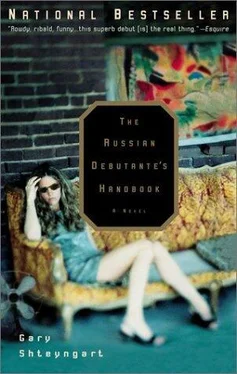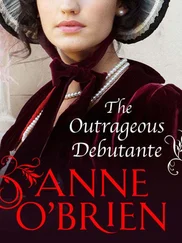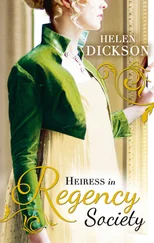Gary Shteyngart - The Russian Debutante's Handbook
Здесь есть возможность читать онлайн «Gary Shteyngart - The Russian Debutante's Handbook» весь текст электронной книги совершенно бесплатно (целиком полную версию без сокращений). В некоторых случаях можно слушать аудио, скачать через торрент в формате fb2 и присутствует краткое содержание. Город: New York, Год выпуска: 2003, ISBN: 2003, Издательство: Riverhead Books, Жанр: Современная проза, Юмористическая проза, на английском языке. Описание произведения, (предисловие) а так же отзывы посетителей доступны на портале библиотеки ЛибКат.
- Название:The Russian Debutante's Handbook
- Автор:
- Издательство:Riverhead Books
- Жанр:
- Год:2003
- Город:New York
- ISBN:0-7865-4177-6
- Рейтинг книги:4 / 5. Голосов: 1
-
Избранное:Добавить в избранное
- Отзывы:
-
Ваша оценка:
- 80
- 1
- 2
- 3
- 4
- 5
The Russian Debutante's Handbook: краткое содержание, описание и аннотация
Предлагаем к чтению аннотацию, описание, краткое содержание или предисловие (зависит от того, что написал сам автор книги «The Russian Debutante's Handbook»). Если вы не нашли необходимую информацию о книге — напишите в комментариях, мы постараемся отыскать её.
and
. The Russian Debutante’s Handbook Bursting with wit, humor, and rare insight,
is both a highly imaginative romp and a serious exploration of what it means to be an immigrant in America.
The Russian Debutante's Handbook — читать онлайн бесплатно полную книгу (весь текст) целиком
Ниже представлен текст книги, разбитый по страницам. Система сохранения места последней прочитанной страницы, позволяет с удобством читать онлайн бесплатно книгу «The Russian Debutante's Handbook», без необходимости каждый раз заново искать на чём Вы остановились. Поставьте закладку, и сможете в любой момент перейти на страницу, на которой закончили чтение.
Интервал:
Закладка:
11. VLADIMIR GIRSHKIN’S DEBUTANTE BALL
IN THE MEANTIME,Frannie was right. Slavophile Frank did love him like crazy. And he wasn’t alone.
Beyond the walls of his new family’s bastion, its terraced loggia surveying the Gotham plain, Vladimir had attracted a loyal cadre of downtown libertines, louche, mostly white folk with improbable names like Hisham and Banjana, and the occasional expatriate from the working class, some poor Tammi Jones. These round-the-clock hipsters, basting in their own suavity and the heady funk of extreme youth, had such a terrific demand for him that Vladimir soon found that his workday was now only an extension of his sleeping hours; real life began as soon as the last refugee was promptly thrown out of the Emma Lazarus Immigrant Absorption Society at 4:59.
HE REGULARLY SAWSlavophile Frank. They would take walks from Frank’s apartment, the house that St. Cyril built, along windswept (even in late summer) Riverside Drive, conversing only in the great and mighty mother tongue. Sometimes they made it as far down as the Algonquin, where Fran awaited them. The Algonquin was a part of the Old New York that Fran so adored, a nostalgia that Vladimir gamely understood, given his own for the sepia-toned Russia of his parents—a sooty and uncomfortable universe, but one with charms of its own. They sat where Dorothy Parker’s round table used to be, and Vladimir would buy Frank a seven-dollar martini. “Seven dollars,” Frank would cry. “Merciful heavens! People do care about me.”
“Seven dollars!” Fran said. “You spoil Frank more than you spoil me. It’s… homoerotic.”
“Perhaps,” Frank said, “but don’t forget that Vladimir has an expansive Russian soul. Money is not his concern. Camaraderie and salvation, that’s his game.”
“He’s a Jew,” Fran reminded them.
“But a Russian Jew,” Frank said triumphantly, slurping at his free drink.
“All things to all people,” Vladimir whispered. Yet upon sight of the bill his expansive Russian soul shuddered within his body’s hairy cage. Truth was that in the thirty-one days of August, Vladimir had expended nearly U.S.$3,000.00, a money trail that blazed across Manhattan as follows:
BAR TABS: $875.00
TRADE PAPERBACKS & ACADEMIC JOURNALS: $450.00
WARDROBE OVERHAUL: $650.00
RETRO LUNCHES, ETHNIC BRUNCHES, SQUID & SAKE SUPPERS: $400.00
TAXI TARIFFS: $350.00
MISCELLANEOUS (Eyebrow waxing fees, aged balsamic vinegar for the Ruoccos, bottles of Calvados brought to parties): $275.00
By August’s end, he was broke. A shameful credit card (the first card ever to bear the Girshkin family name) was winging its way north from the usury capital of Wilmington, Delaware. A depressing thought had flitted through Vladimir’s mind. Perhaps he could ask Frannie’s father for a little handout… Say U.S.$10,000. But then wasn’t he already imposing on the Ruoccos for room and board? Not to mention the family’s lavish hugs and open-mouthed kisses? To ask for pocket money besides…? What hubris.
Yet it was still a mystery to Vladimir how his new friends—theoretically all were starving students—never worried about picking up a round of drinks at the Monkey Bar or buying a Mobutu-style leopard hat on a whim. The Ruoccos, of course, had inherited a half dozen turn-of-the-century cast-iron fortresses around the city, while Frank’s family owned several states tucked away in America’s vast interior. And yet they all looked at Vladimir as the rich working man—the grant-toting, philanthropic professional.
But why shouldn’t Vladimir spend money for the first time in his life?
Just look at him! There he is at some Williamsburg art opening, sneering, scoffing, sniping, pretending to suffer, subtly insulting the gallery owner (a failed conceptualist), while across the room a radiant Francesca is waving for him to come over, and the drunk Adonis Tyson is urgently bleating his name from beneath a wine cart, trying to confirm Bulgakov’s exact patronymic.
It’s been thirteen years since the Leningrad sickbed, since that lifetime of reading Tolstoy’s descriptions of Winter Palace balls while spitting snot into a handkerchief. Finally, it would seem, Vladimir has found his way out into the world. Finally, our debutant is playing Count Vronsky for the downtown nobility in their checkered bowling pants and burnished nylon finery. The reports from the New World were true: In America the streets are paved with gold lamé.
BUT HE COULDN’Tabandon Challah completely. Namely, he couldn’t abandon his share of the rent, else Challah would be homeless. It wasn’t as if she could crash with friends, after all. She had none. Meanwhile, two months had passed since he had stayed at his legal address on Avenue B. Alphabet City was becoming something of a memory now that its romantic poverty no longer warmed the heart.
The next day Vladimir found himself on Avenue B, sitting at the kitchen table filling out an application for a second credit card. Somewhere outside a piece of chicken was being barbecued, and when he closed his eyes and cleared his ears of the urban cacophony Vladimir could almost imagine that he was nine commuter railstops into Westchester, grilling weenies with the Girshkins.
And then Challah came in.
She might as well have bubbled up from Atlantis, this strange outsized woman with the dark makeup and the exposed midriff showing yet another self-mutilation: a navel piercing, from which a heavy silver crucifix dangled on its way to her crotch. Leave it to Challah not to realize that, while small nasal piercings were sanctioned, a crotch-to-navel crucifix absolutely screamed “Connecticut.”
Vladimir was so shocked to see her, he rose automatically from his credit card application, noticing now the full effect of his surroundings: the harness, the leash, the K-Y, the den-o’-vice motif which would have given Dorian Gray a prompt heart attack. So this had been his home! Perhaps Mother had been right about some things.
Challah, on the other hand, did not appear shocked. “Where’s the money?” she said. She stepped over a mysterious jumble of faux fur that blocked the way to the kitchen and then turned on the faucet to wash her hands.
“What money?” Vladimir said. Money, money, he was thinking.
“The rent money,” came the answer from the kitchen.
That money. “I have two hundred,” he said.
Immediately she was back from the kitchen, her arms akimbo. “Where’s the other two hundred?” He had never seen this posture (which was such a crucial part of her job) projected at his person before. Who did she think he was? A client?
“Give me a few days,” he said. “I’m having a cash-flow problem.”
She took a step toward him, and he took a step back to the fire escape, the place he distinctly remembered as their prime cuddling ground, now more plausible as an actual escape route. Fire escape. Yes, it made sense.
“No few days,” she said. “If I don’t pay by the fifth of the month, Ionescu’s going to charge an extra thirty dollars.”
“That bastard,” Vladimir said, hoping for solidarity.
“Bastard?” she said. And then paused as if weighing the heft of that word. Vladimir put his hands out in front of him. He was getting ready to deflect the full force of a comparison between himself and the bastard. Challah spoke instead. “I should be looking for a new roommate, shouldn’t I?” she said.
So he had been downgraded to roommate status. When did all this happen? “Sweetheart,” he said, rather unexpectedly.
“You bastard,” she said finally, but the emotion had clearly been exhausted from that sentiment over the past weeks. Now it was but a statement of fact. “Don’t speak to me until you have the rest of the money.” She stepped aside to indicate that Vladimir could leave.
Читать дальшеИнтервал:
Закладка:
Похожие книги на «The Russian Debutante's Handbook»
Представляем Вашему вниманию похожие книги на «The Russian Debutante's Handbook» списком для выбора. Мы отобрали схожую по названию и смыслу литературу в надежде предоставить читателям больше вариантов отыскать новые, интересные, ещё непрочитанные произведения.
Обсуждение, отзывы о книге «The Russian Debutante's Handbook» и просто собственные мнения читателей. Оставьте ваши комментарии, напишите, что Вы думаете о произведении, его смысле или главных героях. Укажите что конкретно понравилось, а что нет, и почему Вы так считаете.












